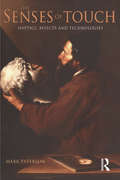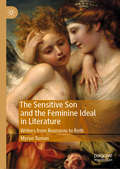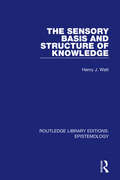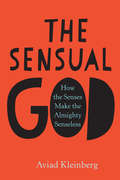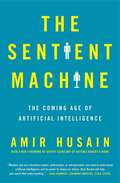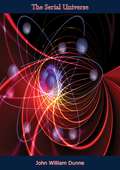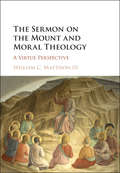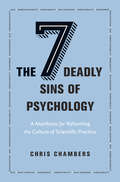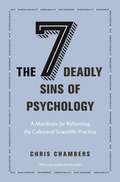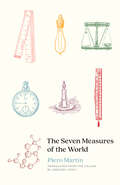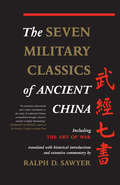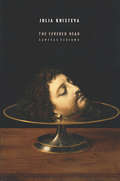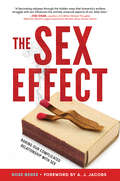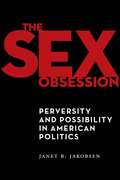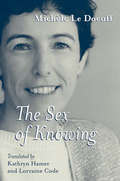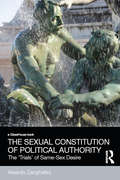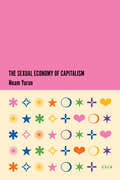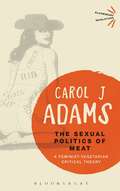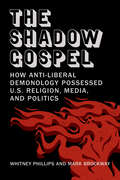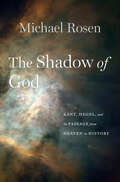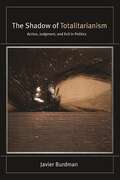- Table View
- List View
The Senses of Touch: Haptics, Affects and Technologies
by Mark PatersonTouch is the first sense to develop in the womb, yet often it is overlooked. The Senses of Touch examines the role of touching and feeling as part of the fabric of everyday, embodied experience. How can we think about touch? Problems of touch and tactility run as a continuous thread in philosophy, psychology, medical writing and representations in art, from Ancient Greece to the present day. Picking through some of these threads, the book 'feels' its way towards writing and thinking about touch as both sensory and affective experience. Taking a broadly phenomenological framework that traces tactility from Aristotle through the Enlightenment to the present day, the book examines the role of touch across a range of experiences including aesthetics, digital design, visual impairment and touch therapies. The Senses of Touch thereby demonstrates the varieties of sensory experience, and explores the diverse range of our 'senses' of touch.
The Sensitive Son and the Feminine Ideal in Literature: Writers from Rousseau to Roth
by Myron TumanThis book considers major male writers from the last three centuries whose relation to a strong, often distant woman—one sometimes modeled on their own mother—forms the romantic core of their greatest narratives. Myron Tuman explores the theory that there is an underlying psychological type, the sensitive son, connecting these otherwise diverse writers. The volume starts and ends with Jean-Jacques Rousseau, whose Confessions provides an early portrait of one such son. There are chapters on other adoring sons, Stendhal, Sacher-Masoch, Scott Fitzgerald, and Turgenev, as well as on sons like Bernard Shaw and D.H. Lawrence with a different, less affectionate psychological disposition toward women. This book demonstrates how, despite many differences, the best works of all these sensitive sons reflect the deep, contorted nature of their desire, a longing that often seems less for an actual woman than for an elusive feminine ideal.
The Sensitivity Principle in Epistemology
by Kelly Becker Tim BlackThe sensitivity principle is a compelling idea in epistemology and is typically characterized as a necessary condition for knowledge. This collection of thirteen new essays constitutes a state-of-the-art discussion of this important principle. Some of the essays build on and strengthen sensitivity-based accounts of knowledge and offer novel defences of those accounts. Others present original objections to sensitivity-based accounts (objections that must be taken seriously even by those who defend enhanced versions of sensitivity) and offer comprehensive analysis and discussion of sensitivity's virtues and problems. The resulting collection will stimulate new debate about the sensitivity principle and will be of great interest and value to scholars and advanced students of epistemology.
The Sensory Basis and Structure of Knowledge (Routledge Library Editions: Epistemology)
by Henry J. WattOriginally published in 1925. If we are to know what intelligence is, how the brain can think, and what place mind holds in the scheme of things, we must first have a science of the sensory basis and structure of knowledge. This book supplies that need; it also serves as a short introduction to the systematic psychology of cognition.
The Sensual God: How the Senses Make the Almighty Senseless
by Aviad KleinbergIn the Old Testament, God wrestles with a man (and loses). In the Talmud, God wriggles his toes to make thunder and takes human form to shave the king of Assyria. In the New Testament, God is made flesh and dwells among humans. For religious thinkers trained in Greek philosophy and its deep distaste for matter, sacred scripture can be distressing. A philosophically respectable God should be untainted by sensuality, yet the God of sacred texts is often embarrassingly sensual.Setting experts' minds at ease was neither easy nor simple, and often faith and logic were stretched to their limits. Focusing on examples from both Christian and Jewish sources, from the Bible to sources from the Late Middle Ages, Aviad Kleinberg examines the way Christian and Jewish philosophers, exegetes, and theologians attempted to reconcile God's supposed ineffability with numerous biblical and postbiblical accounts of seeing, hearing, smelling, touching, and even tasting the almighty. The conceptual entanglements ensnaring religious thinkers, and the strange, ingenious solutions they used to extricate themselves, tell us something profound about human needs and divine attributes, about faith, hope, and cognitive dissonance.
The Sentient Machine: The Coming Age of Artificial Intelligence
by Amir Husain&“A must-read for anyone looking to understand how artificial intelligence is poised to transform human society and life.&” —Paul Scharre, Author of Four Battlegrounds: Power in the Age of Artificial Intelligence The future is now. Acclaimed technologist and inventor Amir Husain explains how we can live amidst the coming age of sentient machines and artificial intelligence—and not only survive, but thrive.Artificial &“machine&” intelligence is playing an ever-greater role in our society. We are already using cruise control in our cars, automatic checkout at the drugstore, and are unable to live without our smartphones. The discussion around AI is polarized; people think either machines will solve all problems for everyone, or they will lead us down a dark, dystopian path into total human irrelevance. Regardless of what you believe, the idea that we might bring forth intelligent creation can be intrinsically frightening. But what if our greatest role as humans so far is that of creators? Amir Husain, a brilliant inventor and computer scientist, argues that we are on the cusp of writing our next, and greatest, creation myth. It is the dawn of a new form of intellectual diversity, one that we need to embrace in order to advance the state of the art in many critical fields, including security, resource management, finance, and energy. &“In The Sentient Machine, Husain prepares us for a brighter future; not with hyperbole about right and wrong, but with serious arguments about risk and potential&” (Dr. Greg Hyslop, Chief Technology Officer, The Boeing Company). He addresses broad existential questions surrounding the coming of AI: Why are we valuable? What can we create in this world? How are we intelligent? What constitutes progress for us? And how might we fail to progress? Husain boils down complex computer science and AI concepts into clear, plainspoken language and draws from a wide variety of cultural and historical references to illustrate his points. Ultimately, Husain challenges many of our societal norms and upends assumptions we hold about &“the good life.&”
The Serial Universe
by John William DunneIn this book I have tried to give the reader a bird's-eye view of the territory covered by the theory called 'Serialism'. Some of the chapters, greatly condensed, have been delivered in lecture form to the Royal College of Science (Mathematical Society and Physical Society). But the main outline of the subject is, I believe, clear enough to be appreciated by those who have no special technical knowledge. Where all is fog, a blind man with a stick is not entirely at a disadvantage. In my case, Fortune presented me with a stick; and I have used this with considerable temerity. Certainly, it has led me somewhere possibly only into the roadway, where I shall be run over by a motor-bus full of scientific critics. But, if I have crossed safely to the other side, then I should like to express my gratitude to Mr J. A. Lauwerys of the University of London, whose continuous encouragement has been the chief factor which has kept me tapping along.
The Sermon on the Mount and Moral Theology: A Virtue Perspective
by Mattison William C. IIIIn this volume, William C. Mattison, III demonstrates that virtue ethics provides a helpful key for unlocking the moral wisdom of the Sermon on the Mount. Showing how familiar texts such as the Beatitudes and Petitions of the Lord's Prayer are more richly understood, and can even be aligned with the theological and cardinal virtues, he also locates in the Sermon classic topics in morality, such as the nature of happiness, intentionality, the intelligibility of human action, and the development of virtue. Yet far from merely placing the teaching of Aristotle in the mouth of Jesus, he demonstrates how the Sermon presents an account of happiness and virtue transformed in the light of Christian faith. The happiness portrayed is that of the Kingdom of heaven, and the habits needed to participate in it in the next life, but even initially in this one, are possible only by God's grace through Jesus Christ, and lived in the community that is the Church.
The Serpent of Paradise
by Erwin W. LutzerDr. Lutzer shows how Satan's rebellion serves God's purposes.
The Seven Deadly Sins of Psychology: A Manifesto for Reforming the Culture of Scientific Practice
by Chris ChambersWhy psychology is in peril as a scientific discipline—and how to save itPsychological science has made extraordinary discoveries about the human mind, but can we trust everything its practitioners are telling us? In recent years, it has become increasingly apparent that a lot of research in psychology is based on weak evidence, questionable practices, and sometimes even fraud. The Seven Deadly Sins of Psychology diagnoses the ills besetting the discipline today and proposes sensible, practical solutions to ensure that it remains a legitimate and reliable science in the years ahead.In this unflinchingly candid manifesto, Chris Chambers draws on his own experiences as a working scientist to reveal a dark side to psychology that few of us ever see. Using the seven deadly sins as a metaphor, he shows how practitioners are vulnerable to powerful biases that undercut the scientific method, how they routinely torture data until it produces outcomes that can be published in prestigious journals, and how studies are much less reliable than advertised. He reveals how a culture of secrecy denies the public and other researchers access to the results of psychology experiments, how fraudulent academics can operate with impunity, and how an obsession with bean counting creates perverse incentives for academics. Left unchecked, these problems threaten the very future of psychology as a science—but help is here.Outlining a core set of best practices that can be applied across the sciences, Chambers demonstrates how all these sins can be corrected by embracing open science, an emerging philosophy that seeks to make research and its outcomes as transparent as possible.
The Seven Deadly Sins of Psychology: A Manifesto for Reforming the Culture of Scientific Practice
by Chris ChambersWhy psychology is in peril as a scientific discipline—and how to save itPsychological science has made extraordinary discoveries about the human mind, but can we trust everything its practitioners are telling us? In recent years, it has become increasingly apparent that a lot of research in psychology is based on weak evidence, questionable practices, and sometimes even fraud. The Seven Deadly Sins of Psychology diagnoses the ills besetting the discipline today and proposes sensible, practical solutions to ensure that it remains a legitimate and reliable science in the years ahead. In this unflinchingly candid manifesto, Chris Chambers shows how practitioners are vulnerable to powerful biases that undercut the scientific method, how they routinely torture data until it produces outcomes that can be published in prestigious journals, and how studies are much less reliable than advertised. Left unchecked, these and other problems threaten the very future of psychology as a science—but help is here.
The Seven Measures of the World
by Piero MartinThe fascinating stories behind the essential seven units of measurement that allow us to understand the physical world “Entertaining popular science and a literate tale of why things are as they are.”—Kirkus Reviews From the beginning of history, measurement has been interwoven into the human experience, shaping our understanding of nature, personal relationships, and the supernatural. We measure the world to know our past, comprehend the present, and plan the future. Renowned physicist Piero Martin explores how scientific knowledge is built around seven key pillars of measurement: the meter for length; the second for time; the kilogram for mass; the kelvin for temperature; the ampere for electricity; the mole for quantity of substance; and the candela for luminous intensity. Martin examines the history and function of these units and illustrates their applications in rich vignettes on a range of topics—from quarks to black holes, from a glass of wine to space exploration. He delves into not only the all-important numbers but also anecdotes that underline each unit’s special quality. At the same time, he explains how each unit contributes to important aspects of science, from classical physics to quantum mechanics, from relativity to chemistry, from cosmology to elementary particle physics, and from medicine to modern technology. Martin eloquently shows how the entire universe can be measured and understood using just seven units.
The Seven Military Classics Of Ancient China
by Ralph D. SawyerThe Seven Military Classics is one of the most profound studies of warfare ever written, a stanchion in sinological and military history. It presents an Eastern tradition of strategic thought that emphasizes outwitting one's opponent through speed, stealth, flexibility, and a minimum of force--an approach very different from that stressed in the West. Safeguarded for centuries by the ruling elite of imperial China, even in modern times these writings have been known only to a handful of Western specialists.This volume contains seven separate essays, written between 500 BCE and 700 CE, that preserve the essential tenets of strategy distilled from the experience of the most brilliant warriors of ancient China.
The Seven Pillars of Statistical Wisdom
by Stephen M. StiglerWhat gives statistics its unity as a science? Stephen Stigler sets forth the seven foundational ideas of statistics--a scientific discipline related to but distinct from mathematics and computer science and one which often seems counterintuitive. His original account will fascinate the interested layperson and engage the professional statistician.
The Severed Head: Capital Visions (European Perspectives: A Series in Social Thought and Cultural Criticism)
by Julia KristevaInformed by a provocative exhibition at the Louvre curated by the author, The Severed Head unpacks artistic representations of severed heads from the Paleolithic period to the present. Surveying paintings, sculptures, and drawings, Julia Kristeva turns her famed critical eye to a study of the head as symbol and metaphor, as religious object and physical fact, further developing a critical theme in her work--the power of horror--and the potential for the face to provide an experience of the sacred.Kristeva considers the head as icon, artifact, and locus of thought, seeking a keener understanding of the violence and desire that drives us to sever, and in some cases keep, such a potent object. Her study stretches all the way back to 6,000 B.C.E., with humans' early decoration and worship of skulls, and follows with the Medusa myth; the mandylion of Laon (a holy relic in which the face of a saint appears on a piece of cloth); the biblical story of John the Baptist and his counterpart, Salome; tales of the guillotine; modern murder mysteries; and even the rhetoric surrounding the fight for and against capital punishment. Kristeva interprets these "capital visions" through the lens of psychoanalysis, drawing infinite connections between their manifestation and sacred experience and very much affirming the possibility of the sacred, even in an era of "faceless" interaction.
The Severity of God
by Paul K. MoserThis book explores the role of divine severity in the character and wisdom of God, and the flux and difficulties of human life in relation to divine salvation. Much has been written on problems of evil, but the matter of divine severity has received relatively little attention. Paul K. Moser discusses the function of philosophy, evidence and miracles in approaching God. He argues that if God's aim is to extend without coercion His lasting life to humans, then commitment to that goal could manifest itself in making human life severe, for the sake of encouraging humans to enter into that cooperative good life. In this scenario, divine agapē is conferred as free gift, but the human reception of it includes stress and struggle in the face of conflicting powers and priorities. Moser's work will be of great interest to students of the philosophy of religion, and theology.
The Sex Effect: Baring Our Complicated Relationship with Sex
by A. J. Jacobs Ross BenesA gripping exploration of the relationship between sex and our society, with a foreword by bestselling author A.J. JacobsWhy do political leaders become entangled in so many sex scandals? How did the U.S. military inadvertently help make San Francisco a mecca of gay culture? And what was the original purpose of vibrators? Find out the answers to all these questions and more as journalist Ross Benes delves into the complicated relationship between everyday human life—including religion, politics, and technology—and our sexuality.Drawing on history, psychology, sociology, and more, The Sex Effect combines innovative research and analysis with captivating anecdotes to reveal just how much sex shapes our society—and what it means for us as humans as we continue to struggle with the wide-ranging effects our sexuality has on the world around us.
The Sex Obsession: Perversity and Possibility in American Politics (Sexual Cultures #55)
by Janet R. JakobsenFinalist, 2021 Lambda Literary Award in LGBTQ StudiesOffers a way to undo the inextricable American knot of sex, politics, religion, and powerAmerican politics are obsessed with sex. Before the first televised presidential debate, John F. Kennedy trailed Richard Nixon in the polls. As Americans tuned in, however, they found Kennedy a younger, more vivacious, and more attractive choice than Nixon. Sexier. The political significance of Kennedy’s telegenic sex appeal is now widely accepted – but taking sexual politics seriously is not. Janet R. Jakobsen examines how, for the last several decades, gender and sexuality have reappeared time and again at the center of political life, marked by a series of widely recognized issues and movements – women’s liberation and gay liberation in the 1960s and ’70s, the AIDS crisis and ACT UP in the ‘80s and ’90s, welfare and immigration “reform” in the ‘90s, wars claiming to “save women” in the 2000s, and battles over health care in the 2010s, to recent demands for reproductive justice, trans liberation, and the explosive exposures of #MeToo.Religion has been wound up in these political struggles, and blamed for not a little of the resistance to meaningful change in America political life. Jakobsen acknowledges that religion is a force to be reckoned with, but decisively breaks with the common sense that religion and sex are the fixed binary of American political life. She instead follows the kaleidoscopic ways in which sexual politics are embedded in social relations of all kinds – not only the intimate relations of love and family with which gender and sex are routinely associated, but also secularism, freedom, race, disability, capitalism, nation and state, housing and the environment.In the midst of these obsessions, Jakobsen’s promiscuous ethical imagination guides us forward. Drawing on examples from collaborative projects among activists, academics and artists, Jakobsen shows that sexual politics can contribute to building justice from the ground up. Gender and sexual relations are practices through which values emerge and communities are made. Sex and desire, gender and embodiment emerge as bases of ethical possibility, breaking political stalemate and opening new possibility.
The Sex of Knowing
by Michèle Le DoeuffFirst published in 2003. Routledge is an imprint of Taylor & Francis, an informa company.
The Sexual Constitution of Political Authority: The 'Trials' of Same-Sex Desire (Social Justice)
by Aleardo ZanghelliniWhile there is no shortage of studies addressing the state’s regulation of the sexual, research into the ways in which the sexual governs the state and its attributes is still in its infancy. The Sexual Constitution of Political Authority argues that there are good reasons to suppose that our understandings of state power quiver with erotic undercurrents. The book maintains, more specifically, that the relationship between ideas of political authority and male same-sex desire is especially fraught. Through a series of case studies where a statesman’s same-sex desire was put on trial (either literally or metaphorically) as a problem for the good exercise of public powers, the book shows the resilience and adaptability of cultural beliefs in the incompatibility between public office and male same-sex desire. Some of the case studies analysed are familiar ground for both political/constitutional history and the history of sexuality. The Sexual Constitution of Political Authority argues, however, that only by systematically reading questions of institutional politics and questions of sexuality through each other will we have access to the most interesting insights that a study of these trials can generate. Whether they involve obscure public officials or iconic rulers such as Hadrian and James I, these compelling fragments of queer history reveal that the disavowal of male same-sex desire has been, and partly remains, central to mainstream understandings of political authority.
The Sexual Economy of Capitalism (Currencies: New Thinking for Financial Times)
by Noam YuranEconomics has long modeled its theories on bakers and butchers rather than husbands, wives, lovers, and prostitutes. This book argues that exchanges involving sex and intimacy, far from being external or exceptional in relation to the workings of the economy, come closest to the reality of capitalist money. Undertaking an inquiry into the sexual economy of capitalism, Noam Yuran analyzes the erotic and gendered meanings that suffuse basic economic concepts, from money to the commodity. It is not entirely true, Yuran shows, that in capitalism everything has its price. In fact, the category of things money cannot buy, including love, forms a central axis around which capitalist economic life is organized. It is inscribed on goods and economic motivations and conduct, and distinguishes capitalism from precapitalist economies in which marriage was an exchange and wives were owned. In conversation with psychoanalysis, feminist theory, and the heterodox tradition of economic thought, this book maps the erotic dimension of capitalism onto concrete economic questions around money, goods, private property, and capital. Yuran offers readers a powerful understanding of capitalism in its unique articulation of love, sex, and money.
The Sexual Politics of Meat: A Feminist-Vegetarian Critical Theory
by Carol J. AdamsThe Sexual Politics of Meat is Carol Adams' inspiring and controversial exploration of the interplay between contemporary society's ingrained cultural misogyny and its obsession with meat and masculinity. Published in the year of the book's 25th anniversary, the Bloomsbury Revelations edition includes a substantial new afterword, including more than 20 new images and discussions of recent events.
The Shadow Gospel: How Anti-liberal Demonology Possessed U.S. Religion, Media, and Politics
by Whitney Phillips Mark BrockwayA novel account of the culture wars and Evangelical influence in the United States that traces the 80-year rise of a quasi-religious anti-liberal demonology.When people talk about the chaotic, increasingly precarious political landscape in the United States, they often blame polarization and the culture wars. In The Shadow Gospel, Whitney Phillips and Mark Brockway tell a very different story. Analyzing eighty years of densely overlapping religious and secular messages preaching the dangers of liberalism, the book argues that the fracture and chaos in U.S. politics isn&’t the result of a clean split between left and right. Instead, it&’s a split between the shadow gospel&’s quasi-religious anti-liberal demonology—the vague sense that an evil leftist force is threatening to destroy American society—and the people accused of being the liberal devil. A shadow gospel framework helps contextualize the violence of January 6, 2021, the fervor of Satanic conspiracy theorizing, and the crusade against &“wokeness&” and LGBTQ existence. But it also helps explain the most vexing elements of our politics: that the most potent source of religious messaging and influence in the United States is secular, that the most ruthless destroyers of Republicans are other Republicans, and that anti-liberal fear and loathing span the political spectrum.By offering new ways of thinking about religious influence, the left/right dichotomy, and the appeal of Donald Trump, The Shadow Gospel reveals the true roadblocks to pluralistic democracy and emphasizes what people across the religious and political spectrum stand to lose if we don&’t exorcise our anti-liberal demons. There are no easy solutions to our vast and complicated political problems. But those solutions will remain elusive if how we frame our problems is part of the problem. It is long past time to drag the shadow gospel out into the light.
The Shadow of God: Kant, Hegel, and the Passage from Heaven to History
by Michael RosenA bold and beautifully written exploration of the “afterlife” of God, showing how apparently secular habits of mind in fact retain the structure of religious thought.Once in the West, our lives were bounded by religion. Then we were guided out of the darkness of faith, we are often told, by the cold light of science and reason. To be modern was to reject the religious for the secular and rational. In a bold retelling of philosophical history, Michael Rosen explains the limits of this story, showing that many modern and apparently secular ways of seeing the world were in fact profoundly shaped by religion.The key thinkers, Rosen argues, were the German Idealists, as they sought to reconcile reason and religion. It was central to Kant’s philosophy that, if God is both just and assigns us to heaven or hell for eternity, we must know what is required of us and be able to choose freely. In trying to live moral lives, Kant argued, we are engaged in a collective enterprise as members of a “Church invisible” working together to achieve justice in history. As later Idealists moved away from Kant’s ideas about personal immortality, this idea of “historical immortality” took center stage. Through social projects that outlive us we maintain a kind of presence after death. Conceptions of historical immortality moved not just into the universalistic ideologies of liberalism and revolutionary socialism but into nationalist and racist doctrines that opposed them. But how, after global wars and genocide, can we retain faith in any conception of shared moral progress and, if not, what is to become of the idea of historical immortality? That is our present predicament.A seamless blend of philosophy and intellectual history, The Shadow of God is a profound exploration of secular modernity’s theistic inheritance.
The Shadow of Totalitarianism: Action, Judgment, and Evil in Politics (SUNY series, Intersections: Philosophy and Critical Theory)
by Javier BurdmanThe Shadow of Totalitarianism develops a new way to think about the problem of evil in politics. Beginning with the commonplace idea that the rise of totalitarianism in the twentieth century marked the emergence of a new form of evil, Javier Burdman finds early seeds of thinking about this form in Immanuel Kant's moral philosophy. Far from being an isolated object of inquiry, evil, Burdman argues, has long shaped and been central to philosophical understandings of political action and judgment. Systematically analyzing the relationship between evil, action, and judgment in the work of Kant, Hannah Arendt, and Jean-François Lyotard, The Shadow of Totalitarianism aligns evil in politics with a desire for moral certainty, hence the emphasis on the need to accept and affirm uncertainty in current ethical theories. The careful philosophical analysis through which Burdman develops this inquiry contributes to a better understanding of some of the theoretical complexities involved in the problem of evil and provides conceptual tools with which to approach it.
